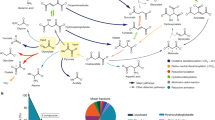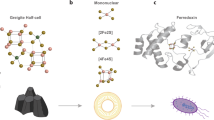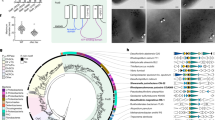Abstract
THE metabolic activity of certain micro-organisms is well known to be dependent on the iron concentration of the culture medium. For example, where cultured at controlled levels of iron, Corynebacterium diphtheriae 1 and Aspergillus niger 2 produce large amounts of toxin and citric acid respectively. Recently we have reported3 the production of ferrichrome A by Ustilago sphaerogena when this fungus is grown under conditions of controlled iron supply.
This is a preview of subscription content, access via your institution
Access options
Subscribe to this journal
Receive 51 print issues and online access
$199.00 per year
only $3.90 per issue
Buy this article
- Purchase on Springer Link
- Instant access to full article PDF
Prices may be subject to local taxes which are calculated during checkout
Similar content being viewed by others
References
Pappenheimer, A. M., “Adv. Prot. Chem.”, 4, 123 (1948).
Shu, P., and Johnson, M. J., Indust. Eng. Chem., 40, 1202 (1948).
Garibaldi, J. A., and Neilands, J. B., J. Amer. Chem. Soc., 77, 2429 (1955).
Neilands, J. B., J. Amer. Chem. Soc., 74, 4846 (1952).
Author information
Authors and Affiliations
Rights and permissions
About this article
Cite this article
GARIBALDI, J., NEILANDS, J. Formation of Iron-binding Compounds by Micro-organisms. Nature 177, 526–527 (1956). https://doi.org/10.1038/177526a0
Issue Date:
DOI: https://doi.org/10.1038/177526a0
This article is cited by
-
The fate of siderophores: antagonistic environmental interactions in exudate-mediated micronutrient uptake
BioMetals (2015)
-
Metallophores and Trace Metal Biogeochemistry
Aquatic Geochemistry (2015)
-
Coupled biogeochemical cycling of iron and manganese as mediated by microbial siderophores
BioMetals (2009)
-
Expression, isolation and properties of Fur (ferric uptake regulation) protein ofEscherichia coli K 12
Biology of Metals (1988)
-
Lunar soil and Zagami meteorite inhibit biosynthesis of itoic acid, a siderophore
Experientia (1987)
Comments
By submitting a comment you agree to abide by our Terms and Community Guidelines. If you find something abusive or that does not comply with our terms or guidelines please flag it as inappropriate.



